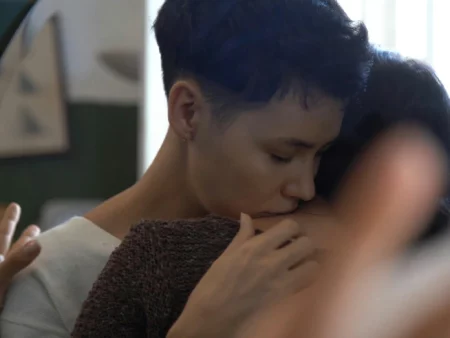In the realm of intimate relationships, few topics spark as much curiosity and debate as the phenomenon of men enjoying being addressed as “daddy.” This intriguing dynamic, far removed from familial connotations, delves into the complex interplay of power, nurturing, and intimacy. Our exploration aims to unravel the psychological threads that weave this dynamic, offering an objective lens through which to view a subject often shrouded in misconception.
As we navigate this sensitive terrain, we’ll examine the multifaceted reasons behind this preference, from the allure of authority to the comfort found in protective roles. By understanding the nuances of this phenomenon, we gain valuable insights into the diverse spectrum of human relationships and the psychological needs they fulfill. Join us as we delve into the heart of this topic, shedding light on a subject that challenges conventional notions of romance and identity.
The Psychology Behind the ‘Daddy’ Dynamic
The allure of being called “daddy” in intimate contexts stems from a complex interplay of psychological factors that tap into deep-seated desires and societal constructs. This phenomenon, far removed from literal paternal associations, unveils intriguing aspects of human psychology and relationship dynamics. Let’s delve into the multifaceted reasons why some men feel drawn to this term:
- Embodiment of Protective Instincts: The “protector” role often associated with fatherhood can make men feel valued and needed, fostering a sense of purpose within the relationship.
- Expression of Nurturing Masculinity: It allows for a unique blend of strength and tenderness, enabling men to explore softer aspects of their character without compromising perceived virility.
- Power Dynamics Exploration: The term implies a consensual power exchange, satisfying desires for dominance or control within a safe, trusting environment.
- Emotional Fulfillment: It can provide validation and reassurance, meeting needs for affection and admiration in a unique way.
- Role-playing Catalyst: It allows partners to step into different personas, enhancing creativity and excitement in their sexual encounters.
- Submission and Trust: For some, it represents a willingness to yield control, deepening the bond between partners.
The psychology behind this preference is not universal; what appeals to one man may not resonate with another. Some guys find the idea uncomfortable, while others view it as a potent expression of desire and attraction. It’s crucial to recognize that enjoying this dynamic doesn’t necessarily indicate unresolved issues or unhealthy attachments.
For many, being called “daddy” serves as a pet name that implies a unique blend of authority and care. It can boost confidence and provide a sense of leadership within the relationship. The term often evokes feelings of security and support, creating a safe space for vulnerability and emotional connection.
This dynamic can also satisfy desires for playfulness and flirtation, adding a layer of excitement to interactions. It may serve as a form of acknowledgment for a man’s maturity, wisdom, or charisma, fostering a sense of pride and appreciation within the relationship.
Ultimately, the appeal lies in its ability to fulfill various psychological needs simultaneously. It’s a complex interplay of fantasy, respect, and intimate communication that, when consensual and well-understood by both partners, can enhance satisfaction in relationships.
The Nurturing Aspect: Protection and Guidance
The allure of being called “daddy” in intimate settings often stems from a deep-seated desire for nurturing and protection. This dynamic taps into fundamental human needs for safety and guidance, creating a unique bond. At its core, this phenomenon reflects a longing for emotional security and the comfort of feeling cared for.
The protective aspect of this role allows individuals to explore vulnerability in a safe environment. It fosters trust, enabling the sharing of deepest fears and desires without judgment. The nurturing element manifests in acts of emotional support, encouragement, and gentle guidance, creating a foundation of stability.
Caregiving extends beyond physical protection, encompassing emotional nurturing. Those who embrace this dynamic often provide comfort during stress, offer wisdom in uncertainty, and celebrate achievements with pride. This multifaceted approach can lead to profound intimacy, strengthening the overall bond.
Interestingly, this dynamic doesn’t necessarily imply inequality. It often represents a consensual exchange of roles, where both find fulfillment in their positions. This balance allows for exploring different aspects of personality and desire within a framework of mutual respect.
When approached with sensitivity and open communication, this role can create a unique space for personal growth and emotional exploration. It allows for experiencing a range of emotions and dynamics that might be challenging to express in everyday life, fostering deeper understanding.

Ultimately, the appeal lies in creating a sanctuary of emotional safety and growth. By embracing the nurturing and protective elements, a unique connection can be forged, transcending conventional boundaries and fostering deep, lasting intimacy.
Trust and Vulnerability in ‘Daddy’ Dynamics
The ‘daddy’ dynamic in relationships can foster a unique environment for trust and vulnerability. This intimate connection allows partners to explore deeper levels of emotional openness and security. Here are key aspects of trust-building within this context:
- Safe space for expression: Encourages open sharing of feelings and desires without fear of judgment
- Emotional availability: Easier vulnerability, knowing there’s a supportive presence
- Boundaries and consent: Clear communication enhances mutual respect and safety
- Nurturing atmosphere: Caregiving promotes a sense of protection and value
- Role exploration: Trying new dynamics leads to self-discovery and increased intimacy
- Validation of needs: Open expression leads to greater self-acceptance and understanding
- Deepened emotional bonds: Shared experiences strengthen overall connection
- Trust exercises: Activities build faith in one’s partner
- Non-judgmental acceptance: Embracing preferences fosters unconditional support
- Psychological safety: Creates an environment where risks feel manageable
- Empowerment through surrender: Paradoxically strengthens personal agency
- Heightened intimacy: Fosters a deeper sense of closeness and understanding
By creating a foundation of trust, couples can explore vulnerability in ways that might be challenging in traditional structures. This openness often extends beyond the bedroom, influencing overall communication and emotional intimacy. However, it’s crucial to approach this dynamic with ongoing dialogue and mutual consent to ensure both partners feel comfortable and respected throughout their journey of trust and vulnerability. The ‘daddy‘ dynamic, when approached mindfully, can serve as a catalyst for profound personal growth and relationship development.
Cultural Shifts: From Taboo to Mainstream
The term “daddy” has undergone a remarkable transformation in popular culture, shifting from a purely familial context to a more complex and sometimes sexualized connotation. This linguistic journey reflects broader changes in societal attitudes towards relationships, intimacy, and power dynamics.
Initially confined to parent-child interactions, the word has transcended its original boundaries, finding new life in adult relationships. This shift can be attributed to various factors, including media influence, changing social norms, and increasing openness about diverse relationship dynamics.
Popular culture, particularly music and social media, has played a significant role in normalizing the use of “daddy” in romantic contexts. Artists across genres have incorporated the term into lyrics, often imbuing it with connotations of authority, desire, and protection. This mainstream exposure has gradually desensitized audiences to its use outside traditional family settings.
The internet age has further accelerated this linguistic evolution. Memes, online communities, and digital subcultures have embraced and reinterpreted the term, creating new layers of meaning and association. What was once taboo has become, for many, a playful expression of affection or a symbol of consensual power dynamics.
As language evolves, so too do our perceptions of intimacy and connection. The journey of ‘daddy’ from the nursery to the bedroom reflects our society’s growing comfort with exploring the nuances of desire and relationship roles. It challenges us to reconsider boundaries between the familial and romantic, inviting deeper conversations about consent, power, and personal identity in our most intimate connections.
This cultural shift has sparked debates about appropriateness and potential psychological implications. However, it’s crucial to recognize that language is fluid, and meanings can coexist without necessarily conflicting. As society continues to evolve, so too will our understanding and use of such terms, challenging us to approach these shifts with openness and nuance.
DDLG Dynamics: Beyond Conventional Relationships
DDLG, short for Daddy Dom/Little Girl, represents a unique subset within BDSM relationships that explores age play and power dynamics. This consensual practice involves one partner assuming a nurturing, authoritative role (the “daddy“), while the other embraces a more childlike persona (the “Little”). It’s crucial to understand that DDLG is distinct from pedophilia and involves consenting adults engaging in role-play.
In DDLG dynamics, the “daddy” figure often provides guidance, protection, and care, creating a safe space for the “little” to explore vulnerability and surrender control. This exchange can manifest in various ways, from playful scenarios to more structured power dynamics. The appeal lies in the creation of a nurturing environment where both parties find fulfillment in their chosen roles.
It’s important to note that DDLG is just one facet of the broader spectrum of “daddy” preferences in relationships. Many individuals who enjoy being called “daddy” may not engage in DDLG practices at all, instead finding the term endearing or empowering within more conventional structures.
The psychology behind DDLG often involves elements of escapism, trust-building, and the exploration of complex emotions. For some, it provides a framework to process past experiences or fulfill unmet needs. However, like all BDSM activities, DDLG requires clear communication, established boundaries, and ongoing consent to ensure a healthy, safe experience for all involved.
Understanding DDLG and similar dynamics helps broaden our perspective on the diverse ways people connect and find meaning in their intimate relationships, challenging conventional notions of power exchange and caregiving roles.
Communication and Consent: Essential Foundations
Open communication and mutual consent form the bedrock of healthy relationships, especially when exploring intimate dynamics like the use of “daddy” as a term of endearment. Establishing clear boundaries and maintaining ongoing dialogue are crucial for nurturing trust and respect between partners. Let’s examine the stark differences between healthy and unhealthy communication practices in this context:
| Healthy Communication | Unhealthy Communication |
|---|---|
| Openly discussing comfort levels with terms like “daddy“ | Assuming partner’s comfort without asking |
| Respecting boundaries and preferences | Pressuring or guilt-tripping into acceptance |
| Regular check-ins about the dynamic | Avoiding discussions about the relationship |
| Expressing desires and concerns honestly | Hiding true feelings or expectations |
| Active listening and empathy | Dismissing partner’s emotions or needs |
| Establishing safe words or signals | Ignoring or overriding agreed-upon limits |
| Seeking mutual understanding and compromise | Prioritizing one’s desires over partner’s comfort |
Fostering a safe environment for open dialogue is essential. Partners should feel comfortable expressing their thoughts, desires, and concerns without fear of judgment or retribution. This level of trust allows for deeper exploration of intimate dynamics while ensuring both individuals feel valued and respected.
Remember, consent is an ongoing process. What feels comfortable today may change tomorrow, and it’s vital to maintain open lines of communication. Regularly revisiting conversations about preferences and boundaries helps keep the relationship dynamic healthy and fulfilling for both partners.
By prioritizing clear, honest, and respectful communication, couples can navigate the complexities of intimate language use with confidence and mutual understanding. This approach not only strengthens the bond between partners but also enhances overall satisfaction.
Implementing these communication strategies can lead to a more fulfilling experience for both partners. It’s crucial to approach discussions about intimate terms like “daddy” with sensitivity and openness. By creating a judgment-free space for dialogue, couples can explore their desires safely and consensually, fostering a deeper connection and mutual respect.
Addressing Discomfort: When ‘Daddy’ Doesn’t Feel Right
When discomfort arises around the use of “daddy” in intimate settings, addressing it promptly and sensitively is crucial. Here are strategies to navigate this delicate situation:
- Initiate an open, judgment-free conversation about preferences and boundaries
- Express feelings honestly, focusing on personal comfort rather than criticism
- Explore the root of discomfort – is it the word itself or its implications?
- Brainstorm alternative terms that evoke similar emotions without discomfort
- Consider playful nicknames that capture the desired dynamic uniquely
- Experiment with different languages for endearments if culturally appropriate
- Focus on actions and behaviors that convey the desired relationship dynamic
- Establish a safe word to pause interactions if discomfort arises
- Seek professional guidance if the issue stems from deeper personal concerns
- Remember that preferences can evolve – agree to revisit the topic periodically
- Explore literature or workshops on communication in intimate relationships
- Practice active listening to fully understand each other’s perspectives
- Consider role-playing exercises to find comfortable expressions of intimacy
- Emphasize mutual respect and consent in all aspects of the relationship
- Use humor to lighten the mood and ease tension during discussions
- Create a list of acceptable terms together, fostering collaboration
- Implement a trial period for new terms to assess comfort levels
- Reflect on past experiences that may influence current preferences
By approaching this challenge with empathy and creativity, couples can find solutions that honor both partners’ comfort levels while maintaining intimacy and connection. Remember, open communication is key to navigating these sensitive topics successfully.
Conclusion: Understanding Personal Preferences
Understanding personal preferences in intimate relationships is crucial for fostering mutual respect and satisfaction. The use of “daddy” as an endearment highlights the diverse nature of human desires and connections. While some find comfort and excitement in this dynamic, others may feel uncomfortable. Open, honest communication remains the cornerstone of healthy partnerships, allowing couples to explore boundaries and express needs safely. Ultimately, respecting individual preferences and maintaining ongoing dialogue creates a foundation for deep, fulfilling relationships that honor both partners’ unique desires and comfort levels. This approach fosters trust, intimacy, and a stronger emotional bond between partners.
Frequently Asked Questions About Men Being Called ‘Daddy’
Does liking the term 'daddy' indicate underlying psychological issues?
Enjoying being called "daddy" doesn't inherently indicate psychological issues. It's a personal preference stemming from various factors, including desires for nurturing roles or power dynamics. However, if it causes distress or interferes with daily life, professional guidance may be beneficial. Open communication and mutual comfort are key in exploring this dynamic. Consensual exploration enhances intimacy.
How can I tell if my partner is comfortable with being called 'daddy'?
To gauge your partner's comfort with "daddy," observe their reaction when you use it. Watch body language and expressions. Initiate an open conversation about preferences and boundaries. Ask directly if they enjoy it or feel uncomfortable. Respect their feelings and explore alternatives if needed. Prioritize open communication for a healthy dynamic.
Are there alternatives to 'daddy' that convey similar feelings?
Alternatives conveying authority, nurturing, or intimacy include "sir," "mister," "captain," "honey," "sweetheart," or "love." Personalized nicknames based on shared experiences can capture the essence without using "daddy." Finding the right term depends on mutual comfort and open communication. Explore options that resonate with both partners' preferences.
Can the use of 'daddy' in relationships affect power dynamics outside the bedroom?
The use of "daddy" can influence dynamics beyond intimate settings, potentially fostering protective behaviors or impacting decision-making. Effects vary based on couples' understanding and boundaries. Open communication is crucial to ensure comfort with emerging power dynamics. This term's impact depends on individual preferences and mutual agreement within the relationship.

Jeffrey Young is an American psychologist renowned for developing schema therapy. He founded the Schema Therapy Institute and is a leader in the field of cognitive behavioral therapy. Young has authored several influential books, including Schema Therapy for professionals and Reinventing Your Life for the general public.







